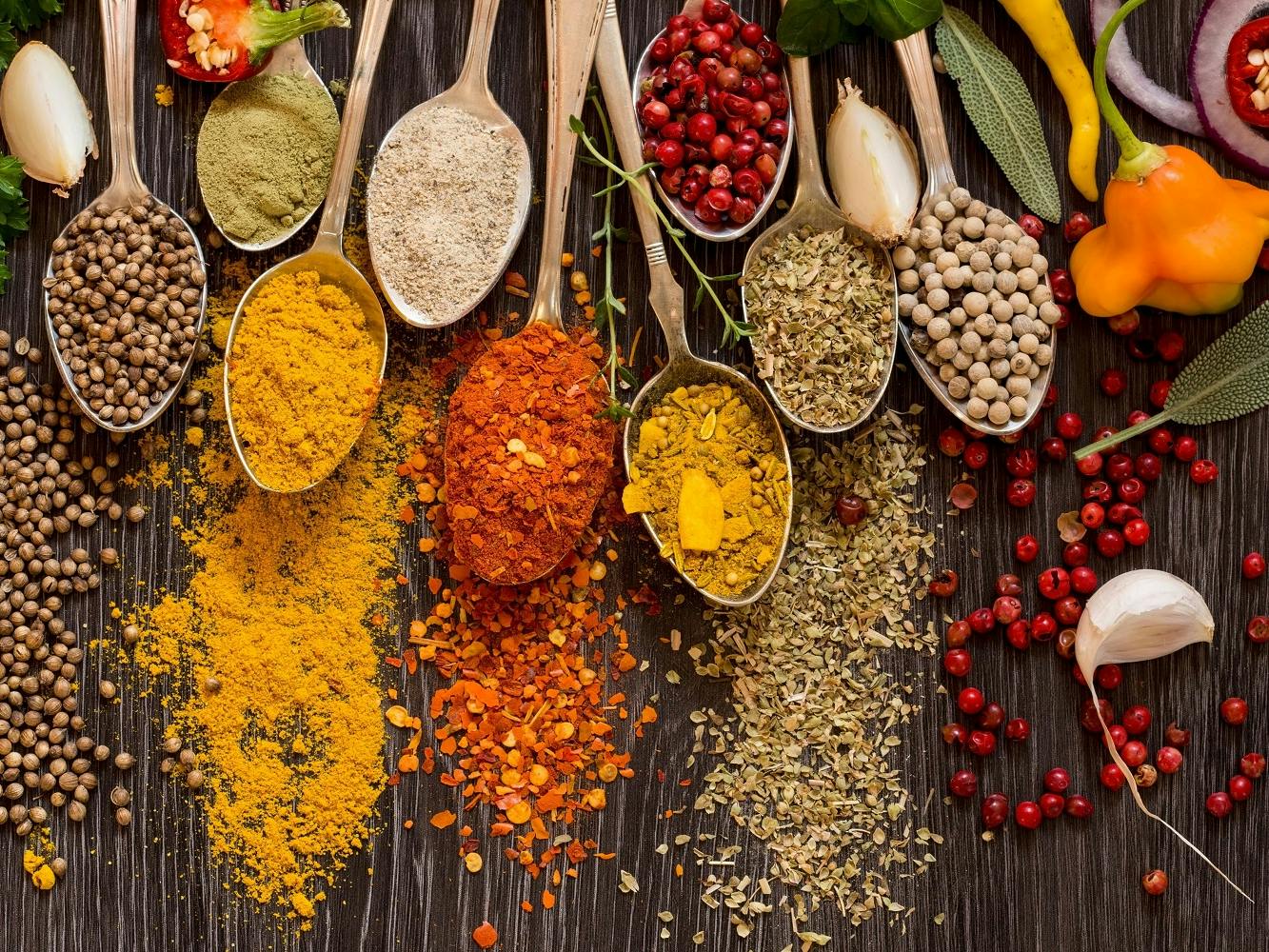
Spices don’t just make food taste better and more interesting. Research shows they may also have powerful health benefits.
Wouldn’t it be great if you could just sprinkle a teaspoon of black pepper over your steak and never worry about cholesterol again?
Okay, that’s not even close to being true.
But researchers are finding that many of the chemicals in spices have beneficial effects on the body, and they’re learning how these substances might be used for more than just making your food more flavorful. While the jury is still out on whether spices can actually cure or prevent diseases on their own, there is some evidence that they may help reduce some risks and symptoms.
One reason spices may promote good health? Many contain high levels of antioxidants. Antioxidants protect your body from free radicals, molecules that cause damage to your cells.
Spices may even help keep the immune system functioning at its best. “While more studies are needed to determine the specific benefits of certain herbs and spices on the immune system, we know that the therapeutic properties, along with a healthful, diverse diet, strengthen overall immune function,” Mascha Davis, MPH, RDN, the author of Eat Your Vitamins told EverydayHealth.com.
More than 100 spices are used in cooking around the world. Here are some popular ones and what’s known so far about their potential health benefits.
Black pepper
It’s on nearly every dinner table, but few of us give it much thought. But black pepper is both an antioxidant and anti-inflammatory, thanks to its most active ingredient, an alkaloid called piperine. Black pepper may help the heart by lowering blood lipids and helping to block cholesterol absorption. Black pepper may also play a role in preventing cancer. Hold the salt and pass the pepper!
Cardamom
Often used in Indian cooking, cardamom enhances both sweet and savory foods. Animal studies have shown that cardamom powder supplements can help prevent obesity and improve glucose intolerance. Cardamom might also play a role in fighting tumors.
Other research is looking at cardamom’s anti-inflammatory and anti-bacterial properties to see if it can have a role in promoting oral health and treating or preventing heart disease, diabetes, and liver disease.
Chili peppers (such as cayenne)
Research suggests that capsaicin, the active ingredient in chili peppers, can help ease internal pain caused by stomach ulcers, by inhibiting the growth of the bacteria that cause these painful sores. Eating chili peppers might even help people lose weight (or is it just that the food is so spicy that no one can eat very much of it?!).
Studies show that people who love spicy foods may live longer. But don’t worry if you’re a wimp when it comes to spicy food. Capsaicin works externally, too. Creams made with capsaicin can reduce muscle aches, joint pain caused by arthritis, or nerve damage due to diabetes.
Cinnamon
A cinnamon bun is not a health food. (Sorry!) But the spice does offer some promising health benefits. So skip the pastry and sprinkle cinnamon in your coffee or on your oatmeal instead. Cinnamon has anti-inflammatory properties which may help ease arthritis. Other possible benefits of cinnamon include lowering blood sugar and reducing cholesterol and triglycerides.
Cumin
A component of curry and staple of many world cuisines, cumin adds warmth and earthiness to many recipes. . . and it can add health benefits, too. The possible effects of cumin include promoting weight loss and lowering cholesterol and blood sugar levels. Studies in animals have even suggested that cumin may be able to help ease stress and prevent memory loss. Now might be a good time to whip up some curry in a hurry!
Garlic
Garlic may be far more useful to human health than keeping vampires away. Studies show that the fragrant bulbs (not technically a spice) can help reduce cholesterol and triglyceride levels and keep blood vessels flexible. Garlic may also help protect against some bacterial infections. In fact, garlic breath aside, eating garlic may even help fight the bacteria that cause dental plaque and gum disease!
Ginger
Ginger is already being used to help ease nausea from motion sickness, chemotherapy, and pregnancy. But ginger’s benefits may go way beyond settling the stomach.
Ginger has anti-inflammatory, antioxidant, anti-tumor, and anti-ulcer properties. (That’s a lot of antis!) Ginger may help prevent or treat heart disease by lowering cholesterol and keeping blood from clotting. Some studies indicate that ginger might help people with type 2 diabetes control their blood sugar. As with other spices, though, more studies are needed before it’s known for sure that ginger is a safe and effective treatment for these diseases.
Turmeric
Turmeric – more specifically, its active component curcumin (which is not the same as cumin) – may be the jack-of-all trades of healthy spices. Studies suggest turmeric may have antioxidant, anti-inflammatory, anti-viral, anti-bacterial, anti-fungal, and even anti-cancer effects.
Turmeric’s possible benefits range from reducing inflammation (easing arthritis and psoriasis), fighting cancer, and even enhancing memory. Research indicates the curcumin in turmeric might help reduce skin irritation in breast cancer patients who have undergone radiation therapy, reduce the risk of heart attacks after bypass surgery, and control knee pain from arthritis as effectively as over-the-counter pain relievers.
It almost seems as if there’s nothing turmeric can’t do. But some medical authorities caution that turmeric may have some unwelcome effects, too, making it too soon for people to start self-medicating with the spice. There’s some evidence, for example, that while curcumin may be beneficial for some cancers, it might make others worse. And it may interact badly with certain medications. But experts say there’s little risk—and perhaps some benefit—in consuming the amount of turmeric that would be added to dishes like curries and Indian dhals.
Using Spices Smartly
While research into the health benefits of spices is promising, there’s still much more to be learned before anyone can stop taking their medications and replacing them with spices. Here’s why.
Many of the existing studies were done on animals, not people. And even when the studies looked at humans, they often involved amounts of spices far greater than what anyone could eat–even if they tried to include very generous amounts in their diet. Or they looked at spices consumed on their own instead of with food – not the way people usually use spices!
Plus, there’s not enough data on the side effects or toxicity of spices at high doses for people to start self-medicating safely. More information is also needed about how spices interact with various medications. Ginger, for instance, may increase the risk of bleeding and interact badly with blood thinning medication such as warfarin (Coumadin), clopidogrel (Plavix), or aspirin.
Rather than taking mega-doses of a spice, you could try cooking new recipes that incorporate it. First, check with your doctor to see if the spice is safe to take with your current medications. If you get the all-clear, go ahead and experiment. . A simple search online will turn up lots of delicious options for adding the spice to your diet.
Will consuming spices in the amounts used in a recipe – often just a teaspoon – provide the health benefits shown in the research studies? So far, we don’t know. But a teaspoon of spice can make vegetable dishes tastier, which might tempt you to eat more vegetables. Spices can also reduce the need for salt in your food, helping keep your blood pressure in check. These benefits alone make spices a smart health choice.
Over time spices lose their flavor, and they may lose their health benefits, too. To keep spices fresh, store them somewhere cool, dark, and dry.
How Medicare Can Help
While Original Medicare doesn’t cover the cost of spices, some Medicare Advantage plans may offer a grocery benefit. You can use this benefit towards the purchase of healthy food. Some plans may also offer coverage for consultations with a nutritionist.
In addition, Medicare covers an annual wellness check where you can review your health markers, including any dietary concerns, with your provider. But if you’re planning to add spices to your diet, give your doctor a call and see if any of them could interfere with your current medications or cause side effects.
Additional resources
- ClearMatch Medicare: Find a Medicare Plan
- Everyday Health: 7 Herbs and Spices That May Help Boost Immunity Naturally
- Medical News Today: What Are the Health Benefits of Cardamom?
- Johns Hopkins Medicine: 5 Spices with Healthy Benefits
- American Heart Association: People Who Eat Chili Pepper May Live Longer



